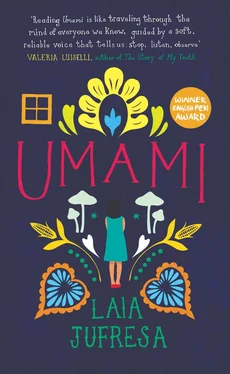‘What an ingenious guy, no? Great way to justify his ciggie in the middle of a kids’ party. You’d never get away with it today.’ And then, without a pause, Marina adds, ‘I wish my dad had walked out on us.’
‘You don’t mean that.’
‘I do. He was a dad to remember, not to keep; he still is.’
‘What are you trying to say to me?’
‘Nothing.’
Marina wants to talk about the shoes. About the witchy, leather shoes.
‘Where did you get those shoes?’
But Chela ignores her. She crosses her arms, clutching a hand with each armpit, and leans forward. ‘Do you think,’ she asks very attentively, a lot like Marina’s therapist, ‘I should go knock for Pina tomorrow? For her, I mean, would it do her any good if I did?’
But Mr. Therapist never asks her truly difficult things like this. Marina would rather go back to talking about herself than answer this, even if it means conjuring the unfamiliar first person: she’d rather be analyzed than handed the threads that tie other people to their children. She’d rather Chela ask her anything else: even about her weight.
Marina blinks in an attempt to look confused; she wants to do a Chela and ignore the question, move onto something else. Weren’t they talking about her? Yes, about her and her dad, or about Doctora Vargas, but not about Chela, and certainly not about Pina. At the same time it flatters her in some way that Chela asks for her opinion. But it also — she realizes finally, and not without some surprise — makes her mad.
It makes her mad. Really pisses her off. They drive her fucking crazy, these irresponsible parents, and she can feel the carbs pulsing in her legs: the rage and the energy. The crepes start to ferment in her bile, and the real intentions behind dessert become clear to her: a posteriori comfort: that goddamn fixation of parents with alleviating their guilt with sugary treats. Of making everything better by having kids. Procreation as a palliative. She too, by the way, has considered it: stopping her pill to see if at last Chihuahua will agree to move in with her, to share the bills: ‘Bat for the same team,’ she says. ‘As if putting up with you were a game!’ he says. The last time they fought, Marina asked him to ‘contain her’. Later on, with a helping nudge from Mr. Therapist of course, she saw the connection: she wants someone to contain her, and that’s why she flirts with the idea of becoming a container herself, of fabricating a living remedy in her tummy, something to entertain them, something that’ll renew them. (The game is: Russian Dolls.) And then? If it doesn’t work out you pack up and move to the tropics. Marina instantly throws the idea out again. She wants to take her pill right now in case Chihuahua calls, but Chela is still there in front of her, waiting attentively, doglike. Marina spots the bronco, takes a running jump and straddles it.
‘Truthfully?’ The nape of her neck shudders.
Chela says yes, smiling to encourage her to go on. She has some wrinkles on her cheeks that Marina hadn’t noticed until now; two semicircles, which don’t make her any less beautiful, but simply exist there as evidence that life doesn’t turn out how you plan it.
‘Truthfully, I don’t think it’d do her any good,’ Marina says.
She knows she’s doing it all wrong, but it feels right to do it wrong. She even moves her hands like her therapist does when he’s explaining things.
‘She must have grieved very hard for you. And if she’s already processed that, if she’s already gone through the different stages, you’re only going to come and whip the rug from under her feet. Some damage is irreversible, in my view.’
Chela doesn’t stop nodding her head, very slowly, soaking in the wisdom that Marina — at least at this moment — really does believe she possesses. In the second before she continues her monologue, Marina asks herself what Linda will have to say about all this: will she see that Marina is doing Pina a favor because Chela is a mom to remember, not to keep? Or will she disapprove of Marina’s impromptu project? Anyway, it’s too late to go back now. Marina can feel a small vortex winding its way up her sternum; her jargon bulb lights up; she defines every one of the grieving stages; pontificates briefly on the Electra complex; she comes up with absurd artistic references for the loss of a mother: the Pietà , ‘but the other way round’. And all the while one part of her is saying, ‘keep-your-nose-out-little-girl’, and the other part sticks two fingers up at her inner brother and leads her on in her blundering revenge (for all the damaged kids out there!) while she takes Chela’s hands and tells her, ‘Don’t fuck her up any more than you already have, Chela.’
And that’s when, very slowly, Chela stops nodding her head, unfolds her legs and bends over like a folding chair to do up her witch shoes. And she does all of this so slowly Marina can’t tell if she’s leaving or just feeling chilly. But then she gets up, goes toward the door, and by the time Marina understands that Chela is indeed listening to what she’s said, that Chela is leaving the mews without having knocked on her daughter’s door, her daughter who she hasn’t seen in three years, Marina understands the price of that invisible bronco, she understands that she’s spoken her last words; her final, malignant, and satisfying words. And before Chela has even opened the door, Marina is awash with a feeling of remorse, or perhaps just of abandonment. Everything is tinged with that Sunday feeling: the end of a play date (the game was: Afternoon Tea). Marina then makes what she deems to be an aesthetic effort to concentrate, appreciate, and mentally record these last Neptunian moments, as the beautiful, defeated beach-creature wraps her flimsy scarf around her neck, takes her old-fashioned jacket from the back of the chair and puts it on. Chela then opens the door, picks up the soaking trash bag, and wraps it around her head like a cape, or a hood, the most pathetic of armors. Chela is leaving, and Marina didn’t tell her — isn’t ever going to get the chance to tell her — that her first name is Dulce. And yet, before closing the door behind her, as if she somehow did know, and from inside the two parentheses that cup her mouth when she smiles, Chela promises her, ‘You’ll go to heaven, sweet Marina.’
Reborn dolls are handmade. The people who make them are known as reborners. Once Noelia had made up her mind to buy herself a little doll, she did some research on the sketchy, dial-up nineties Internet and chose a reborner who lived in Stratford-upon-Avon: so that’s where we went. For the first time, tiny size-0 garments — all strictly folkloric — found their way into our cases. Noelia bought the clothes as a gift for the reborner, but we both knew that they were actually for Maria (as she’d already decided to name her doll).
‘Noelia,’ I said, ‘calling a doll dressed up in traditional Mexican outfits Maria is as ludicrous as calling a dog Pup, or a pub The Tavern, or a wine bar Bar à Vin.’
To which she replied that Maria was going to be neither a pet animal nor a drinking establishment, and that she wasn’t best pleased about me calling her a doll, even though that’s precisely what she was, and even though Chris had told us that it was very important that we never forget that that’s precisely what she was. The way Noelia saw it, given that we didn’t have a snowball’s chance in hell of forgetting she was a doll, it was hardly necessary to keep reminding ourselves every five minutes, and so wasn’t it just better if we didn’t refer to the doll as a doll, because she didn’t like it, period. I was about to protest but she held up her index finger and said, categorically and when we were already on our flight to Heathrow, ‘Promise me you’re not going to call her that again, at least not between us.’
Читать дальше












